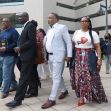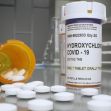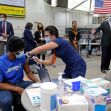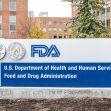The US National Institutes of Health (NIH) and pharmaceutical company Moderna are fighting over who should get the official credit for the innovative component of the ground-breaking COVID-19 vaccine. When first working together to battle COVID-19, the NIH called it the “NIH-Moderna COVID-19 vaccine.” Now, both companies are locked in a bitter feud about who invented the final product.
Moderna’s principal patent application names its own employees as the sole inventors of a crucial component of their coronavirus vaccine, but does not name three NIH government scientists who worked with them on the project.
At stake is ownership of this first-ever, genetic sequence vaccine that triggers an immune response in the body against the COVID-19 virus.
The NIH claims three of their scientists, NIH Director Dr. John R. Mascola, Dr. Barney S. Graham, and Dr. Kizzmekia S. Corbett worked alongside Moderna scientists to create the unique genetic sequence.
Moderna stated in their principal patent application filling that they “reached good-faith determination that these individuals did not co-invent” the cutting-edge new genetic sequence component in the vaccine. Instead, Moderna listed its own employees on the patent application, which has not been approved yet.
On November 9, an advocacy group called Public Citizen published a letter when the conflict between Moderna and the NIH emerged after the US patent was filed by Moderna. In a letter sent to the NIH director, Dr. Francis S. Collins, they asked him to “publicly clarify the role of the NIH in the invention of the vaccine” and asked what he planned to do so that “the contributions of federal scientists are fully recognized.”
In the document, former NIH official Dr. Barney Graham wrote, “The NIH and its academic partners have done seminal work underpinning coronavirus vaccine development” and “we documented how nearly all the leading coronavirus vaccines use the NIH stabilized spike protein technology. We did the front end. They did the middle and we did the back end. A lack of transparency precluded us from identifying additional patent applications specific to mRNA-1273.”
At stake, Graham believes, is the very safety of many millions of people around the globe.
“Because co-inventorship creates a presumption of co-ownership, this series of exclusions could have important public health consequences if and when the patent applications mature into issued patents around the world,” he stated.
The law concerning US patents and ownership specifically notes the ability of the US government, in specific cases, to claim ownership of a patent.
Article 1, Section 8, Clause 8 of the US Constitution grants Congress the power “to promote the Progress of Science and useful Arts, by securing for limited Times to Authors and Inventors the exclusive Right to their respective Writings and Discoveries.” However, since Moderna was working jointly with the NIH to create a vaccine to combat COVID-19, another law may be at play, with a different result.
The Bayh-Dole Act, originally called the Patent and Trademark Act Amendments, is a federal law launched in 1980 that “enables universities, nonprofit research institutions and small businesses to own, patent and commercialize inventions developed under federally funded research programs within their organizations.” This law deals with ownership of inventions developed by private businesses with federal funding.
As to the ownership of this patent under US patent law, according to Public Citizen, “a person who makes a significant contribution to the conception of an invention is a joint inventor. [A] joint inventor as to even one claim enjoys a presumption of ownership in the entire patent. U.S. law requires the patent application to list the correct inventors.”
Moderna spokesperson Colleen Hussey said they “recognized the substantial role that the NIH has played in developing Moderna’s COVID-19 vaccine.” However, she added, “only Moderna’s scientists designed” the Moderna vaccine.
The NIH worked with Moderna to design the vaccine, and the US gave the company $1.4 billion to create and test it, plus another $8.1 billion to produce and then give out 500 million doses of the vaccine.
If the NIH scientists are named on the patent as co-inventors of the Moderna vaccine, that means the US could legally license the product to other organizations. Though this would undoubtedly greatly grow the reach of the vaccine, it would also disrupt the profits Moderna would reap as the sole owner of the vaccine.
Despite the legal battle facing Moderna and NIH, even if the US gains control of the patent as a co-owner, one thing is certain. A business trying to replicate the vaccine would not have the actual specifics, and just like your Grandmother’s secret recipe for Thanksgiving stuffing, you might have all the ingredients but without the specific directions, something will always be missing.






